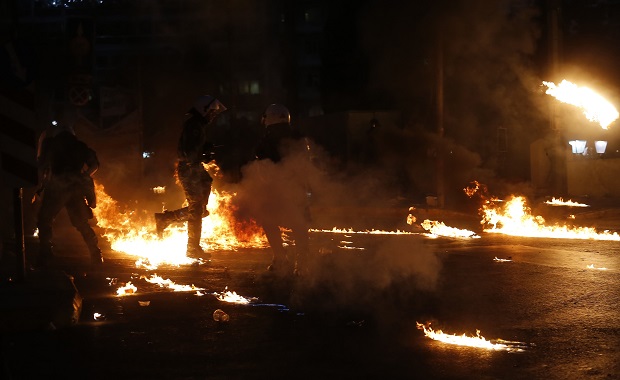Greek lawmakers back bailout as clashes erupt in Athens

Riot police is on fire try as anti-austerity protesters throw petrol bombs during clashes in Athens, Wednesday, July 15, 2015. Greece has a tentative rescue deal, but relief that it is not falling out of the euro is unlikely to last long: its economy has taken a huge hit. Months of political brinkmanship, uncertainty and bank closures have hurt companies and brought everyday business to a standstill. AP
ATHENS, Greece – Greek lawmakers voted in favor of a deeply contentious bailout package in the early hours of Thursday, clearing the first hurdle towards securing a Eurozone rescue but leaving the radical left government weakened.
Prime Minister Alexis Tsipras managed to push through a series of unpopular reforms demanded by the country’s international creditors, despite scenes of anger over austerity in Athens, where protesters threw firebombs at police.
But the PM suffered a major mutiny from his lawmakers — 32 out of 149 voted against the measures, and a further six abstained — and had to rely on the support of pro-European opposition parties.
A final count showed 229 members of parliament out of 300 voted in favor of the measures, which included sweeping changes to Greece’s taxes, pensions and labor rules, with 64 voting against and six abstaining.
But for Greece to secure funds, the agreement must still go before the domestic parliaments of some of the other 19 members of the Eurozone, with all eyes in particular on EU powerhouse Germany, which is set to vote on Friday.
Article continues after this advertisementOnly after that can the tough talks to finalize the long-awaited deal, expected to take much of the summer, begin in earnest.
Article continues after this advertisementEurozone finance ministers were set to hold a conference call on Thursday to discuss the next step in finalizing what will be the debt-laden country’s third bailout, worth up to 86 billion euros ($94 billion).
‘No other option’
Tsipras is facing a broader revolt over the reforms as his left-wing Syriza party came to power in January on anti-austerity promises.
“I had specific choices before me: one was to accept a deal I disagree with on many points, another was a disorderly default,” he said in an impassioned speech to parliament before the vote.
“We will not back down from our pledge to fight to the end for the right of the working people,” he said, adding that “there is no other option but for all of us to share the weight of this responsibility”.
Many of Syriza’s hardline leftists voted against the measures, as did former finance minister Yanis Varoufakis, the head of parliament Zoe Constantopoulou and Energy Minister Panagiotis Lafazanis.
The junior ministers of defence and labour also opposed the deal.
It was a bitter victory for Tsipras, who has said he does not believe in the deal, but sees it as the only way of preventing his country from crashing out of the Eurozone.
The viability of the bailout has also been called into doubt by the International Monetary Fund, which issued a stark warning that Greece’s creditors will have to go “far beyond” existing estimates for debt relief — an issue Eurozone hawks such as Germany have already rejected out of hand.
Greece’s finance minister, Euclid Tsakalotos, said during Wednesday’s parliamentary debate that his decision to also back the bailout terms was something that “will burden me my whole life”.
“I don’t know if we did the right thing. I do know we did something we felt we had no choice over,” he said.
Tsipras’s government also suffered its first resignations, with a junior finance minister and a senior economy ministry official walking out in protest.
‘We said No’
The majority of Greeks voted against similar austerity terms in a referendum on July 5, and furious demonstrators threw firebombs at police in front of parliament ahead of the vote.
“Our government is a government of traitors. We voted ‘No’, then Tsipras signs up to even worse conditions. It’s madness,” raged unemployed demonstrator Arsenios Pappas.
As police fired tear gas to push back the crowds, a sign held high by protesters read “We said ‘No’, we meant ‘No'”.
“He lied to us. So if he has any dignity left he has to resign,” said 28-year-old Andronicus Sarlakis.
Under the deal, Eurozone governments will contribute between 40 and 50 billion euros, the IMF will contribute another chunk and the rest will come from selling off state assets and from financial markets, a European official said.
Greek assets for privatization will be parked in a special fund worth up to 50 billion euros, with some 25 billion euros of the money earmarked to recapitalize Greece’s banks.
The European Central Bank has been keeping Greek banks afloat with emergency liquidity, but it could be forced to cut off that aid if Greece misses a huge debt repayment due on Monday.
European governments are meanwhile divided over options to help Greece meet its short-term cash needs while it waits for the Eurozone bailout deal to be finalized, which will likely take at least four weeks.
The European Commission on Wednesday formally backed a controversial proposal to use an EU-wide crisis fund to cover Greece’s short-term cash needs, officials said, setting up a clash with Britain and Germany.